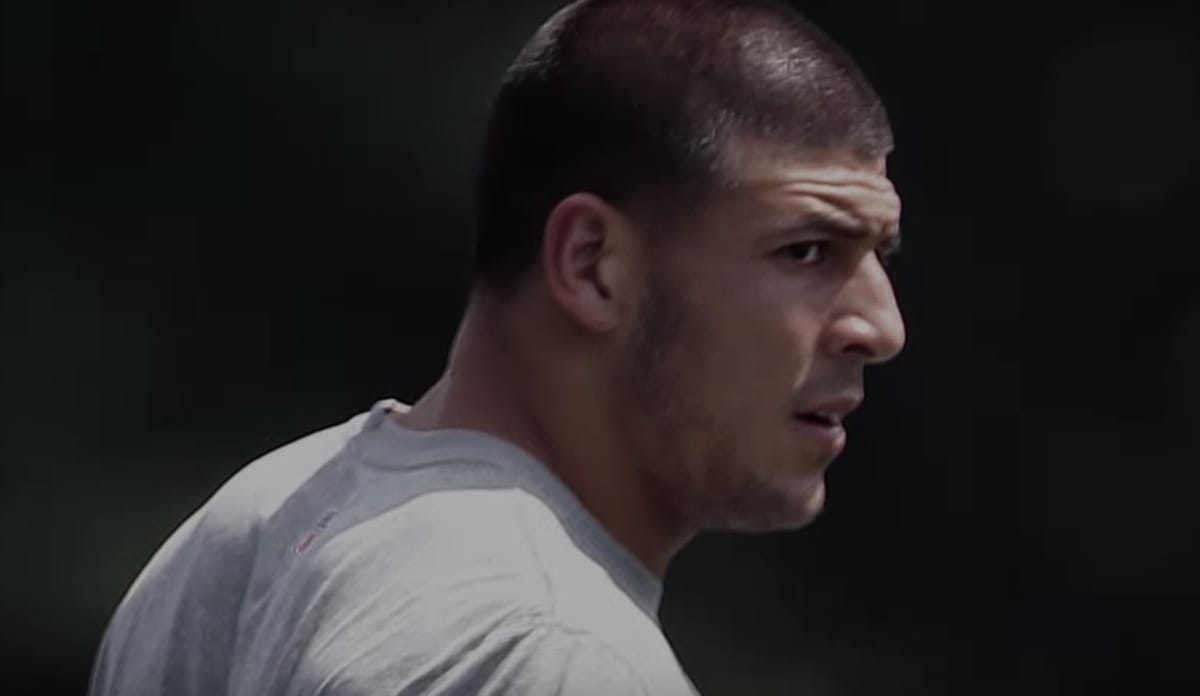New Trailer Released For The 3-Part Aaron Hernandez Documentary Coming To Netflix
If we’re learned anything from the powerful documentaries of late (Surviving R. Kelly, Leaving Neverland, etc.) is that our perceived notions of what we thought was the whole story were nothing compared to the truth. In other words, these hard-hitting documentaries explore a person or topic with a deeper lens, which in turn opens the door wide open to a full new understanding. This latest documentary is showing that we only knew a portion of the truth.
“Killer Inside: The Mind of Aaron Hernandez” is a new documentary on Netflix that will be premiering on Jan. 15.

The 3-part series looks into the story of the former NFL player who reportedly committed suicide inside his prison cell in 2017. If the documentary is anything like the trailer, we’re in for a crazy ride — and not the right kind, but the ones that leave you bewildered.
While the public has some perspective on the situation that landed Hernandez in jail, the show goes in deeper into his childhood, family, and life before he became a superstar athlete.
The series takes a look at the making of the NFL pro and how Hernandez was propelled from high school football player to a multi-million dollar contract.

It’s a fascinating look to see how this charming young kid turned out to be a killer. If we have learned from any other True Crime stories is that a killer isn’t just a sociopath, sometimes this killer tendencies develope over time, and we never know what was at the root of their issues.
With Hernandez, we learn through this series that his family had a lot to do with how his life would play out later.

The trailer includes conversations that he had over the phone with his mother, including one in which he tells her that there was no way he would ever turn out to be an angel, especially because she was never there for him.
The show will also include the turbulent relationship he had with his abusive father. An investigative report in Spotlight inside the Boston Globe released in 2018 added detailed accounts of how Hernandez suffered at the hands of his father.
“Aaron and his older brother were often beaten and brutalized by their dad,” the Boston Globe reports. “Aaron didn’t cry at his father’s funeral, and people took note. He kept it all inside.” His brother said that they both lived in “constant fear of their father’s beatings.”
Hernandez and his mother also had a very tumultuous relationship. It seemed as if football was his only way out of that chaotic family life. His high school friends recall him as a kind person, amusing, and said he didn’t pick on other kids.
When the Patriots gave him a $40 million contract, Hernandez’s life just got more out of control.

The trailer shows that all the suffering he went through at home, combined with superstardom, the pressures of delivering for the Patriots, “made him a ticking time bomb.” Not only did Hernandez get into a life of alcohol, drugs, and weapons, and as a witness in his trial said, “it was like he was out to prove something.”
In 2015, Hernandez was charged for the murder of Odin Lloyd, a former football player who was dating the sister of Hernandez’s fiancee, Shayanna Jenkins. Hernandez was let go from the team even though he told his coach he had nothing to do with the murder. As the documentary shows, he was able to play a successful season with the Patriots even though he had killed someone.
The trailer also explores one of the most interesting aspects of the life of Hernandez, which concerned his mental health caused by CTE.

The documentary shows how Hernandez went from being a fun-loving yet troubled kid to an angry adult that would get violent at the drop of a dime. That kind of drastic change, including his suicide, is speculated to have been a result of his diagnosis of chronic traumatic encephalopathy (CTE). CTE is caused after a person receives multiple blows to the head. It’s been highly reported that, more often than not, NFL players have been diagnosed with CTE. The unfortunate aspect of this illness is that people cannot be diagnosed until they are dead. That is when their brains can be studied.
The symptoms of CTE include memory loss, confusion, impaired judgment, impulse control problems, aggression, depression, anxiety, suicidality, parkinsonism, and, eventually, progressive dementia. Hernandez clearly showed many of these symptoms, including his eventual suicide in 2017.




